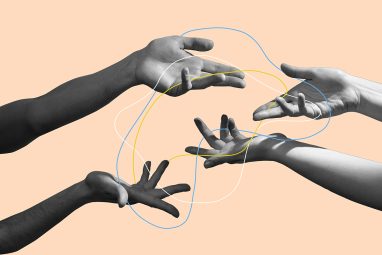Why You Can’t Hire for Skills Without a Skills-Based Culture
To show results, skills-based talent practices require organizational culture shifts and a long-term commitment.
News
- Identity-based Attacks Account for 60% of Leading Cyber Threats, Report Finds
- CERN and Pure Storage Partner to Power Data Innovation in High-Energy Physics
- CyberArk Launches New Machine Identity Security Platform to Protect Cloud Workloads
- Why Cloud Security Is Breaking — And How Leaders Can Fix It
- IBM z17 Mainframe to Power AI Adoption at Scale
- Global GenAI Spending to Hit $644 Billion by 2025, Gartner Projects

Andrew Baker/Ikon Images
SKILLS-BASED HIRING has, in some ways, become a victim of its own success. The approach was touted as a solution to what employers perceived as endemic talent shortages, expanding the aperture for businesses that were hungry for talent but struggling to fill the most in-demand roles. Unsurprisingly, it led to pronouncements by CEOs, governors, and U.S. federal agencies that called for the removal of degree requirements for many roles. But only a few short years after the governors of Colorado and Maryland led the way in embracing skills-based hiring, the inevitable happened: Initial research findings indicated that skills-based hiring initiatives were failing to live up to proponents’ lofty expectations.
But skills-based practices — which start with skills-based hiring and include practices related to promotion and retention — won’t yield positive impacts overnight. Rather than representing the workforce version of a health fad, skills-based practices are more akin to making long-term healthy lifestyle changes: interventions requiring consistent, concerted effort, with outcomes that are hard to observe in the very short term.
It’s no secret that poor habits can be hard to break. And, as with efforts to build muscle, progress isn’t always immediate, particularly when dealing with complex systems like the labor market. Employers and the nonprofits, intermediaries, and workforce organizations that are trying to implement new approaches need to do more hard work before anyone can draw meaningful conclusions on the efficacy of skills-based approaches.
Making good on the promise of a skills-based approach to hiring hinges on longer-term shifts in the mindsets, culture, practices, and procedures that underpin the day-to-day activities of employers. Developing healthy hiring habits will be neither fast nor easy. Breaking existing habits starts with understanding how they emerged in the first place.
Outgrowing Traditional Hiring Habits
Our overreliance on resumes and college degrees began almost a century ago. That’s a long time for habits and biases to calcify — making the difficulty in broadly implementing skills-based hiring, and therefore the longer timeline in seeing widespread results, entirely predictable.
Supporters of skills-based practices, including my team at Jobs for the Future (JFF), have always understood that this hiring transition wouldn’t be as straightforward as “just remove degree requirements from job descriptions.” At JFF, we have experienced the challenges firsthand in our own efforts to embrace the practice.
From reconsidering how skills or competencies are measured, documented, and shared to rebuilding talent pipelines to make them more accessible to individuals from a wide range of educational and economic backgrounds, there are many changes that need to be made. But none, perhaps, is as tricky as changing culture. After all, buying a new tool or platform to support skills-sharing is simple compared with changing hearts and minds. The challenge in changing company culture is also apparent when it comes to adopting skills-based practices: The people who will be most affected by this approach are also the most likely to be somewhat skeptical of it. In a 2022 survey JFF commissioned, 48% of C-suite-level respondents strongly agreed that organizations should hire based on skills rather than degrees; the percentage fell to 40% for executive-level respondents and 35% for director-level and HR respondents.
Culture change in an organization involves a shift in collective behaviors, attitudes, and values. Moving toward a skills-based talent management system requires new ways of doing business — and building those new muscles starts with a culture that is supportive of the new goals and is willing to adapt to new norms. It will take time for employees to form new habits and recenter their focus on skills and demonstrated ability (rather than pedigree or resume), but when an organization embraces a skills-based approach at the cultural level, it’s better positioned to implement it successfully.
Implementing Skills-Based Practices
At JFF, we have engaged with over 100 employers that are looking to become skills-based in their approach to talent management. As a result, we’ve gotten a front-row seat to this work — and we’ve seen why it’s so valuable to stick it out, especially when it feels like the road to success may be too long.
The good news is that while the path may be winding, JFF is beginning to develop a road map for success. Promising case studies demonstrate not just the feasibility of skills-based approaches but also the process of implementing them.
Accenture, for example, began its skills-driven journey in 2014 by starting to build both a skills taxonomy and the infrastructure for skills-based practices. The company, which is part of JFF’s Impact Employer network, gradually embedded skills into how it assesses, hires, and advances its people; over time, such practices were adopted across the enterprise. As a result, skills have become a “currency” within the organization, enhancing workforce mobility, optimizing internal capacity, improving project matching, and refining talent investment strategies. The organization’s focus on continuous learning ensures that its people are building skills that keep pace with technology developments like generative AI, with the company having trained over 500,000 of its people on generative AI fundamentals to date. This cultural emphasis on skills has positioned Accenture as a leader in skills-based talent management, driving both internal development and external competitiveness.
Launching, optimizing, and maintaining skills-based talent practices is resource-intensive work — and, as Accenture’s experience shows, doesn’t happen overnight. Several investments must be made — and maintained — to develop a culture that is supportive of a skills-based approach, including the following:
- Proactively building the business case, organizationwide. Leadership should communicate clearly and frequently about how skills-based practices benefit both the organization and individual employees. These types of conversations should start early (before actual changes take place) and happen often, across all levels of the organization. The involvement of hiring managers and staff members is critical to ensuring the practical implementation of skills-based practices, and when all employees understand and embrace the value of skills over degrees, the organization is better positioned to succeed. Senior leaders play an important role in setting the tone: By adopting skills-based practices in their own hiring decisions, they demonstrate to the entire organization that the practices are priorities, not just rhetoric.
- Realigning incentives to remove barriers. Traditional hiring metrics often emphasize speed-to-hire and retention, encouraging managers to rely on educational credentials as a quick and easy measure of competence. To foster a true skills-based culture, organizations need to shift incentives to reward managers who embrace these new practices and prioritize skills over degrees, thus reducing the perceived risks involved in such hires.
- Providing ongoing training and feedback opportunities. Ensuring that employees across the enterprise have the training and resources they need to adopt skills-based practices is an ongoing task. Hiring managers on the front lines of this cultural shift, in particular, will need training and support as they build confidence in evaluating candidates without traditional credentials. Additionally, companies should encourage conversations across all levels of the organization that allow employees to identify legacy approaches that are limiting their adoption of skills-based practices — in recruitment strategies, for example, or a lack of digital tools to document skills. Optimizing processes to be skills-focused will rely on a cycle of continuous improvement.
- Building a culture of inclusion. An inclusive culture that values different backgrounds and perspectives is essential to making skills-based hiring a success, given that it ensures that candidates without traditional educational credentials are valued and supported. Such efforts help dismantle barriers to economic success for all, including people of color and people from low-income communities.
Skills-Based Approaches in Practice
Best Buy, a Fortune 500 retailer with about 80,000 employees across the country (and a member of JFF’s Impact Employer network), began its skills-based journey in 2020 amid pandemic disruption. The company observed stark differences between employees hired pre- and post-pandemic: While tenured employees often focused on traditional “ladder” career progression, newer employees sought greater flexibility and career path options, expressing a willingness to leave if they couldn’t see clear development opportunities.
Using skills-based practices to support retention during a tight labor market (and the “great resignation” as the pandemic waned) provided a clear value proposition that resonated across the enterprise. Best Buy established a skills task force that held weekly meetings that brought together representatives from enterprise learning, talent management, work effectiveness, talent acquisition, technology teams, and field leadership to support communication about the skills-based strategy. The company also integrated discussions about skills-based practices into regular team meetings and talent-planning processes. Recognizing the power of executive sponsorship in fostering cultural change, Best Buy’s CEO made this work a priority, showing that the transformation extended all the way to the top.
By demonstrating that such efforts yielded positive outcomes for multiple stakeholders, the company successfully increased the adoption of skills-based hiring. For example, a store manager from Mobile, Alabama, who completed a rotation with Best Buy’s corporate-level workforce planning team brought valuable front-line perspectives to the team’s work, which led to new insights and improvements in workforce optimization at the corporate level. The success of this experience led other business leaders to recognize the value of bringing store-level expertise into corporate functions and to seek similar talent rotations. The store manager, meanwhile, returned to Mobile and was quickly promoted to director based on her new skill set.
Prioritizing internal mobility has, over time, led to deeper buy-in of skills-based practices and has led Best Buy to shed practices that weren’t serving it well. As Ryan Hanson, who started as a cashier and now leads enterprise learning at the company, explained, “We have 80,000 employees that we can feed into these jobs that people are going to school for, that they’re qualified for, and the structure of the organization just wasn’t allowing us to do that.”
The positive outcomes of investing in skills-based talent practices can be far-reaching and long-lasting. Importantly, these benefits flow to both employers and employees. A 2024 study found that skills-based hiring not only expands the size of the talent pool for employers but also leads to higher retention rates: When hired into roles that previously had degree requirements, nondegreed candidates were found to stay longer, with a two-year retention rate that was 10 percentage points higher, on average, than that of their peers with degrees. Workers without a bachelor’s degree, meanwhile, see an average increase in salary of about 25% when they move into a position that previously required a degree, according to the same report.
Of course, adopting skills-based hiring and talent habits is easier said than done. As traditional education systems struggle to keep pace with evolving employer needs, and younger workers increasingly seek alternative paths to quality jobs, adopting skills-based practices is a valuable approach to helping companies thrive while unlocking more accessible pathways to economic mobility.





